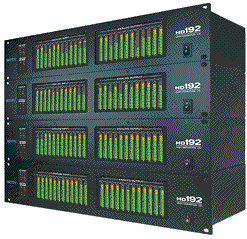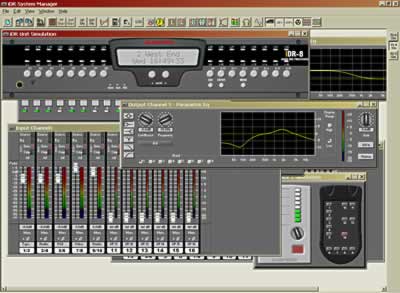Sony/Tree Studios in Nashville has significantly streamlined its ability to handle digital audio data with the installation of an A/V SAN PRO system from Studio Network Solutions. According to studio manager Pat McMakin, an engineer, producer and mixer who has worked with artists such as ‘N SYNC, Brooks & Dunn and Olivia Newton-John, the A/V SAN PRO has eliminated “sneaker-net” through the ultra-high-speed Fibre Channel networking of three Pro Tools systems, one of which is located in a separate building. The studio is currently working on linking the A/V SAN PRO to yet another facility several blocks away, via fiber-optic cable.
“Prior to the installation of the A/V SAN PRO, my assistant engineer spent most of his time moving and managing hard drives throughout the three-room facility,” explains McMakin. “Now that we can access any drive in any room, my assistant engineer can go back to being an assistant engineer. Plus, with SCSI’s maximum cable length of about three feet, we never would have been able to link studios that were blocks apart. But now, with the Fibre Channel’s ability to reach some seven miles, that idea can become a reality.”
McMakin first learned of the A/V SAN PRO through the strong endorsement of his local Pro Tools dealer, Frank Conway at Audio One. “That caused me to look further into the system and ultimately purchase one,” says McMakin, who had been considering networking options for a couple of years. “The A/V SAN PRO has really made a huge difference for our entire workflow, combining speed and centralized storage with ultra-reliability and multi-user access. The A/V SAN PRO is a real problem-solver that has allowed us to unify our entire production workflow.”
Previously, McMakin continues, “it took an incredible amount of time to back up the considerable volume of work produced at the studio. Now, with the A/V SAN PRO, everything is backed up in one place automatically. We don’t have to haul drives in from other rooms and have my assistant sitting there backing up each individual drive. It’s nice to have the peace of mind that the whole network is backed up every night.”
Conway based his A/V SAN PRO recommendation to McMakin on his experience with other SAN’s. “I think the biggest reason I like the A/V SAN PRO is because it was designed by audio people, for audio people,” says Conway. “Many other SAN’s are built with off-the-shelf components. SNS has customized cards and software built specifically for audio and video. Audio files are transferred in small bits very quickly, whereas video files are transferred in bigger slower chunks. The A/V SAN PRO does that and is so powerful; it allows me to have some 128 tracks of 48/24 audio with heavy edit density on a single drive. With other storage solutions that is not remotely an option.”
The A/V SAN PRO becomes the backbone of any studio facility by employing fiber channel technology connecting multiple systems like Avid, Pro Tools, Sonic Solutions and Final Cut Pro into one storage/access location. Studio Network Solutions systems are designed to remain stable under the most extreme conditions. The A/V SAN PRO has earned respect among industry leaders as being nothing less than bulletproof and is scalable from a single-seat to 20 seats or more as requirements increase.
 CueMix DSP
CueMix DSP iDR-8 uses a fixed architecture, with full processing resources available to up to 16 inputs and 16 outputs (iDR-8 has 8 inputs and 8 outputs and can be expanded using iDR-in and iDR-out units), making it impossible to run out of DSP power. This rigid structure is reflected in the software, which uses a straightforward channel-by-channel format rather than the CAD style employed in some other DSP systems.
iDR-8 uses a fixed architecture, with full processing resources available to up to 16 inputs and 16 outputs (iDR-8 has 8 inputs and 8 outputs and can be expanded using iDR-in and iDR-out units), making it impossible to run out of DSP power. This rigid structure is reflected in the software, which uses a straightforward channel-by-channel format rather than the CAD style employed in some other DSP systems.